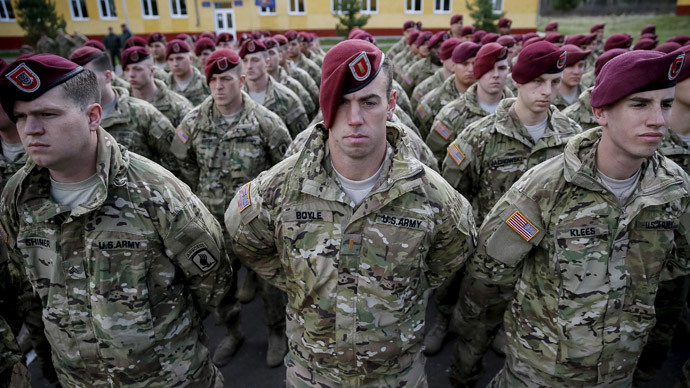Kiev to allow foreign armed forces in Ukraine, incl. ‘potential carriers of nukes’

The Ukrainian parliament has adopted amendments to state law allowing “admission of the armed forces of other states on the territory of Ukraine.” The possible hosting of foreign weapons of mass destruction is also mentioned in the documents.
READ MORE: Kremlin: Timing of Kiev-provoked Donbass tensions linked with looming EU summit
Amendments to Ukrainian law were adopted on Thursday by the
Verkhovna Rada, receiving a majority of 240 votes (the required
minimum being 226). The bill was submitted to the parliament in
May by PM Arseny Yatsenyuk. It focuses on the provision of
“international peacekeeping and security” assistance to
Ukraine at its request.
Peacekeeping missions are to be deployed “on the basis of
decision of the UN and/or the EU,” the bill published on the parliament’s official
website says.
READ MORE: Deployment of peacekeepers should be
agreed with both sides of Ukrainian conflict –
Lavrov
Previously, the presence of any international military forces on
the territory of Ukraine not specifically sanctioned by state law
was only possible by adopting a special law initiated by the
president. Implementation of the new amendments “will create
necessary conditions for deployment on the territory of Ukraine
international peacekeeping and security” missions without
the need for additional legal authorization, the explanatory note
to the draft bill said.
The presence of such armed forces in Ukraine “should ensure
an early normalization of situation” in Donbass, the note
added, saying that they would help “restore law and order and
life, constitutional rights and freedoms of citizens” in the
Donetsk and Lugansk regions.
In a comparative table, published among the accompanying
documents to the bill, “potential carriers of nuclear and
other types of weapons of mass destruction are permitted under
international agreement with Ukraine for short-term
accommodation,” with Kiev providing proper control during
the period that such forces were stationed there.
READ MORE: 'There are no madmen in EU' to send peacekeepers to Ukraine – Lavrov
Implementation of the law “will not require additional
expenditures from the State Budget of Ukraine,” its
documents say.
The previous law also required that the length of time temporary
peacekeeping forces were to be deployed in Ukraine be stipulated,
while the new amendments allow an indefinite period, long enough
“to achieve the goal of the stay.”
READ MORE: 'Plumes of smoke everywhere': RT crew witnesses Donetsk shelling aftermath (DRONE VIDEO)
A separate amendment banned the presence of “armed forces of states that unleash military aggression against Ukraine.” This appears to be a clear reference to the Rada’s January statement calling Russia an “aggressor” – although the body has been reluctant to approve a legally binding law saying exactly that.
Moscow denies being part of the conflict, stressing that Kiev is
fighting a civil war with eastern Ukrainians, not Russian forces.
The Kremlin has consistently and adamantly denied any presence of
Russian troops or hardware in eastern Ukraine, pointing out that
there is no evidence proving otherwise.
READ
MORE: ‘Stick to Minsk deal’: Russia slams Ukraine idea for EU
peacekeepers
With violence in south-eastern Ukraine on the rise again, it is
“very important to avoid any actions or steps that provoke
escalation of tension,” Kremlin spokesman Dmitry Peskov said
on Thursday, as quoted by RIA Novosti. Saying that there is
“no shortage” of provocative actions from Kiev’s side,
Peskov said the main point is “to concentrate on
implementation of [Minsk] agreements.”“This is what
Moscow expects the most,” he added.
The new bill on international peacekeeping missions in Ukraine
contradicts the Minsk agreements, Russian State Duma MP Leonid
Slutsky said. “Minsk-2 did not provide for peacekeepers in
resolution of the national conflict,” Slutsky said, as quoted by
TASS.
The new legal act is “doomed for inaction,” a member of
the Russian Duma’s defense committee, Franz Klintsevich, said,
adding that the bill is “pure PR and propaganda.” “I cannot
simulate a situation in which the United Nations will vote to
deploy international military to Ukraine,” Klintsevich told
journalists, as cited by RIA Novosti.
READ MORE: US knowingly conceals E. Ukrainian ceasefire violations by Kiev – leak
The Lugansk People’s Republic’s envoy to the so-called Contact
Group on Ukraine in Minsk, Vladislav Dainego, commented that the
law was adopted to “justify the presence” of foreign
military that are “already operating in Ukraine.” “There are
some 20,000 [troops], primarily from Hungary and Poland,”
Dainego claimed when speaking to Interfax, adding that the status
of those forces was unclear.
Kiev came up with the initiative to employ peacekeeping missions
in Donbass earlier this year. Moscow has insisted that deployment
of such forces in Ukraine would be relevant only after all points
of the Minsk agreement have been fully implemented, and only if
both sides of the conflict – Kiev and the rebel republics – agree
to the measure.
READ MORE: US ignores OSCE data, blames ‘majority’ of Ukraine truce violations on rebels












